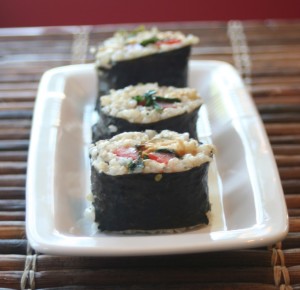My name is Amy Vig and I blog over at Delicious by Nature. I’m excited to join you all at Fake Food Free while Lori is out because I share many of her same philosophies and love hearing about all of her adventures while living abroad.
When Lori asked me to put together a post, we immediately agreed that whole grains would be an interesting topic to cover. I know that many of us are striving to fit more and more of these powerful little babies into our diets. And for those of you who aren’t…well why the heck aren’t you? Need some motivation?*
- Removing the bran and germ of grains, which is what happens when they refine them, results in the loss of key nutrients such as thiamine
- Whole grains are a great source of complex carbohydrates, dietary fiber, minerals, and B vitamins
- They have a higher protein content and quality than refined ones
- Whole grain diets have been shown to help protect against the development of some chronic diseases including colon diseases, heart disease, diabetes, and cancer
A few tips for replacement:
Parboiling brown rice for about 20 minutes will make it more similar in cooking time to white rice and allows for easier replacement. Bring a large pot of water to a boil, add rice, and boil like pasta for 20 minutes. Drain when just starting to soften and set the rice aside. This can be done a couple days ahead of time and then used instead of white rice in recipes like my Paella for 30.
Use whole grain or brown rice pasta in place of regular pasta when cooking at home. My boyfriend swears that the brown rice pasta isn’t even noticeably different, just be sure not to overcook it or it will become quite sticky and gummy. I make a gluten free and cheese free Creamy Mushroom and Sausage Pasta using the brown rice penne from Trader Joe’s.
Replace your usual white products with other things entirely. Sometimes, changing your expectations entirely is easier than adjusting to something that just isn’t the same. In cases where imitation just won’t do, I use things like quinoa to give my dishes a new flavor and texture.
Quinoa is an ancient grain that’s a bit nutty and cooks up in 15 minutes – much shorter than your average brown rice! I love it in my Almond Quinoa Muffins (gluten free) or Quinoa Tabbouleh. I also love how Lori used the wheatberry, another underused whole grain, in this Tropical Wheatberry Salad.
One of my favorite whole grain recipes is for brown rice sushi wraps. By using short grain brown rice and a little rice vinegar wrapped in nori, you have a great base for all kinds of creative lunches. Fill it with just about anything you like!

Tempeh Sushi Rolls
Makes 3 rolls
1/2 block tempeh (about 4 oz)
1/4 cup tamari
2 Tbsp mirin
1 Tbsp wasabi powder
1 cup short grain brown rice
2 cups water
1/2 tsp salt
2 tsp coconut oil, divided
1/3 cup seasoned rice vinegar
1 small red bell pepper, julienned
8 leaves kale (preferably lacinato), removed from stem and thinly sliced
Salt and freshly ground black pepper
3 sheets nori
Wasabi and tamari for dipping
1. Steam tempeh for 10-15 minutes until it has “puffed up”. Remove from steamer and slice into julienne strips (about 10 from the 1/2 block)
2. Combine tamari, mirin, and wasabi powder. Mix well. Add tempeh strips into bowl, stir gently to coat, and let marinate at least 30 minutes
3. Cook rice. Once done, pour onto a large baking sheet and season with rice vinegar. Spread evenly across sheet and allow to cool.
4. Heat a small skillet over medium heat. Add 1 tsp coconut oil, then add sliced kale. Stir and cook for about 5 minutes, until tender adding tempeh marinade as you go. Season with salt and pepper.
5. Heat a cast iron skillet over medium heat. Add 1 tsp coconut oil. Remove tempeh from the marinade and then add to the pan, allowing it to brown on each side before removing to a plate.
6. Lay nori on a sushi mat. Spread rice onto the nori (leaving 1/2 inch at closest end to you and 1 inch at the farthest end), then create a thin row of peppers, kale, at the end closest to you. Then use mat to roll away from you, pressing firmly to keep everything together, then sealing the nori with water at the end. Slice into about 6 rounds to serve.
*All whole grain nutrition information came from “The Encyclopedia of Healing Foods” by Michael Murray. This book is a great source of information on the nutritional value of foods and how to use them.
P.S. In case you are just stopping by, I’m in the process of moving back to the US and am currently on an extended trip in SE Asia. I have weekly guest posts lined up this month and will be stopping by with foodie pictures from our travels as time permits.
Photo courtesy of the guest author.





such good information on whole grains and the recipe links are so very good….
we don’t get quinoa here in india but we do get wheat berries and barley and several types of millets…i use them extensively in soups, khichri and breads….
according to ayurveda , whole grains are alkalising food and regular use ensures active detoxificatin of the inner tract too…
thankyou Lori for bringing so many good posts our way..
I’ve recently discovered BROWN basmati rice- I got really excited! I’m looking forward to trying it but I got it from a bulk bin so I have no idea how to cook it. Should be interesting 🙂
I just purchased a whole bag of Japanese brown rice and can’t wait to use it! Having grown up eating steamed white rice with every meal, it’s a little difficult to break away but my husband and I really enjoy the more firm texture and nutty flavor of brown rice. Your sushi rolls will definitely be tried out!
Great post and I love the detailed information about whole grains…I’ve got to try your sushi rolls; they look incredibly tasty. I’m excited to meet you in San Fran at Foodbuzz. Have a great day!
Hi guys – Amy here. I just realized that some of my links aren’t working due to my blog’s changeover. Feel free to visit http://www.deliciousbynature.com/blog and search for any of the recipes I referenced. My apologies for the inconvenience!
Sagan – Brown basmati rice is cooked in a 2:1 ratio of water to rice. Bring the water to a boil, add the rice, reduce to a simmer, cover and cook for about 45 minutes.
whole grains are just wonderful, thanks for the tips on parboiling. Many people don’t like them because they take so long to cook.
I love quinoa too, especially since it’s a complete protein.